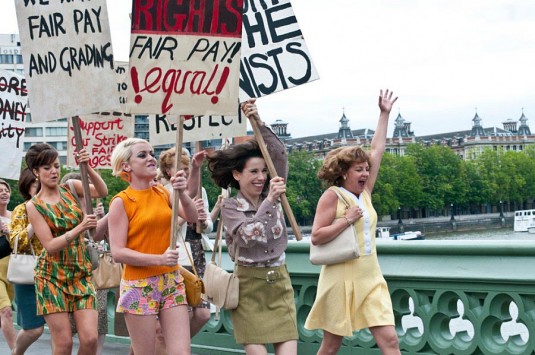Not since Lynn Redgrave graced the lead role inthe 1966 British film Georgy Girl,” has a bonafide “ugly duckling” connected so well with critical audiences as Sally Hawkins did in the 2008 “Happy Go Lucky.” Two years and a Golden Globe award later, Sally is back with sass. Proving her role in the previous Mike Leigh film was not a one-off, Hawkins soars in this historical ode to the power of feminine determination in the face of long odds.
 Playing a composite character in a historical benchmark that led to equal pay for women workers in 1960s England, Hawkins dominates a film that swerves mostly authentically between pathos and comedy and slice-of-life familial and class tensions. Abetted by the always outstanding Bob Hoskins as a prodding shop steward type and a fine Miranda Richarson as a sympathetic Labor Minister, Hawkins sacrifices, asserts, and networks her way into eventual victory after an initial almost accidental drafting into the role as the movement’s leader. She’s equally able to soothe her husband’s vulnerability in the face of day-to-day sacrifices made on behalf of the womans’ strike as she is to face down a government minister. And she’s as believable to the core because in all essence she’s the ultra-talented personification of waxen, gorgeous normalcy.
Playing a composite character in a historical benchmark that led to equal pay for women workers in 1960s England, Hawkins dominates a film that swerves mostly authentically between pathos and comedy and slice-of-life familial and class tensions. Abetted by the always outstanding Bob Hoskins as a prodding shop steward type and a fine Miranda Richarson as a sympathetic Labor Minister, Hawkins sacrifices, asserts, and networks her way into eventual victory after an initial almost accidental drafting into the role as the movement’s leader. She’s equally able to soothe her husband’s vulnerability in the face of day-to-day sacrifices made on behalf of the womans’ strike as she is to face down a government minister. And she’s as believable to the core because in all essence she’s the ultra-talented personification of waxen, gorgeous normalcy.

